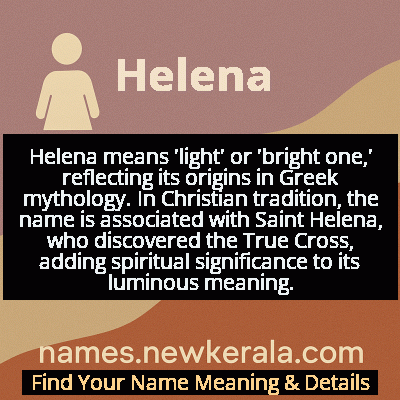Helena Name Meaning & Details
Origin, Popularity, Numerology Analysis & Name Meaning of Helena
Discover the origin, meaning, and cultural significance of the name HELENA. Delve into its historical roots and explore the lasting impact it has had on communities and traditions.
Name
Helena
Gender
Female
Origin
Christian
Lucky Number
9
Meaning of the Name - Helena
Helena means 'light' or 'bright one,' reflecting its origins in Greek mythology. In Christian tradition, the name is associated with Saint Helena, who discovered the True Cross, adding spiritual significance to its luminous meaning.
Helena - Complete Numerology Analysis
Your Numerology Number
Based on Pythagorean Numerology System
Ruling Planet
Mars
Positive Nature
Generous, passionate, energetic, and humanitarian.
Negative Traits
Impulsive, impatient, moody, and can be overly emotional.
Lucky Colours
Red, maroon, scarlet.
Lucky Days
Tuesday.
Lucky Stones
Red coral, garnet.
Harmony Numbers
1, 2, 3, 6.
Best Suited Professions
Military, sports, philanthropy, leadership roles.
What People Like About You
Courage, energy, leadership, generosity.
Famous People Named Helena
Helena Blavatsky
Occultist and Author
Co-founded the Theosophical Society and pioneered modern spiritual movements
Helena Bonham Carter
Actress
Acclaimed film career with numerous award nominations and iconic character portrayals
Saint Helena
Roman Empress
Credited with discovering the True Cross and promoting Christianity throughout the Roman Empire
Helena Rubinstein
Businesswoman
Built a global cosmetics empire and revolutionized the beauty industry
Name Variations & International Equivalents
Click on blue names to explore their detailed meanings. Gray names with will be available soon.
Cultural & Historical Significance
Extended Personality Analysis
Women named Helena are often characterized by a unique blend of classical elegance and intellectual depth. They typically possess strong leadership qualities tempered with emotional intelligence, making them effective in both professional and personal spheres. The name's mythological heritage often translates into expectations of beauty, charm, and persuasive ability, while its Christian associations suggest integrity, spiritual depth, and moral strength. Helenas frequently demonstrate artistic sensibilities and creative expression, whether through visual arts, writing, or performance. They tend to be independent thinkers with a strong sense of self, yet maintain traditional values of loyalty and commitment to family and community. This complex personality profile—balancing worldly sophistication with spiritual depth, personal ambition with service to others—makes Helenas often appear both approachable and mysterious. They typically navigate life with a grace that belies inner strength, capable of both passionate engagement and thoughtful reflection. The dual heritage of their name often manifests as a personality that embraces contradiction, finding harmony between tradition and innovation, sensuality and spirituality, individual expression and community responsibility.
Modern Usage & Popularity
In contemporary times, Helena has experienced a significant revival and maintains steady popularity across many cultures. The name appeals to modern parents seeking a classic yet distinctive choice that bridges traditional elegance with contemporary sophistication. In English-speaking countries, it has climbed popularity charts while avoiding over-saturation, making it an ideal choice for parents wanting a recognizable but not overly common name. Its international versatility is particularly valued in our globalized world, with variations of Helena being popular across Europe, the Americas, and beyond. The name's strong historical and literary associations give it depth and character, while its melodic sound and feminine ending align with current naming trends. Helena strikes a perfect balance between being substantial enough for professional life yet soft enough for personal intimacy. Its usage spans diverse socioeconomic and educational backgrounds, though it remains particularly popular among families with European heritage or those valuing classical education and cultural literacy. The name's enduring appeal suggests it will continue to be a sophisticated choice for generations to come.
Symbolic & Spiritual Meanings
Symbolically, Helena represents illumination, transformation, and the integration of opposing forces. The name's etymological connection to 'light' or 'torch' establishes it as a symbol of enlightenment, guidance, and intellectual illumination—like a beacon cutting through darkness. This luminous quality extends metaphorically to represent clarity of thought, spiritual awakening, and the pursuit of truth. The mythological Helen symbolizes the transformative power of beauty and desire, representing how individual presence can alter historical trajectories and inspire both creation and destruction. Saint Helena's discovery of the True Cross adds layers of spiritual revelation, faith, and the triumph of divine truth over worldly obstacles. The name also carries connotations of resilience and redemption, as both mythological and historical Helenas often navigated complex circumstances with grace and emerged transformed. In psychological terms, Helena represents the integration of physical and spiritual beauty, worldly experience and inner wisdom, making it a name that embodies the complete human journey toward wholeness and self-realization. It symbolizes the capacity to bring light to darkness, meaning to chaos, and beauty to ordinary existence.

